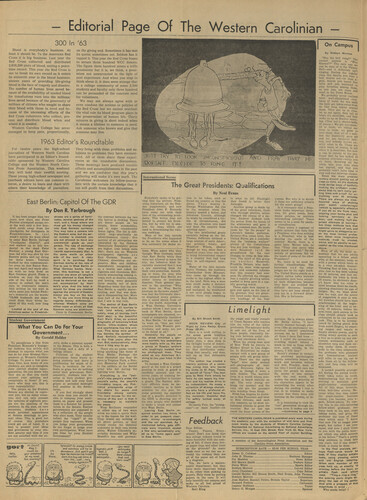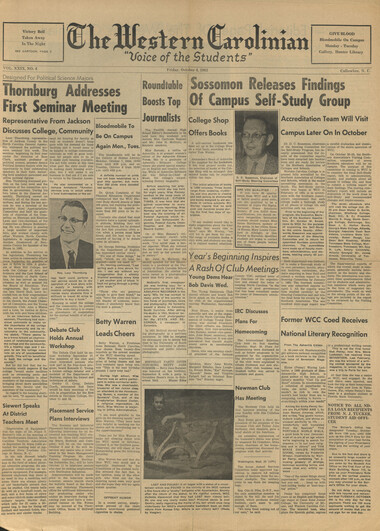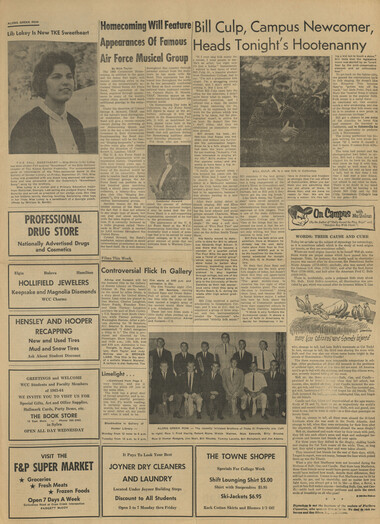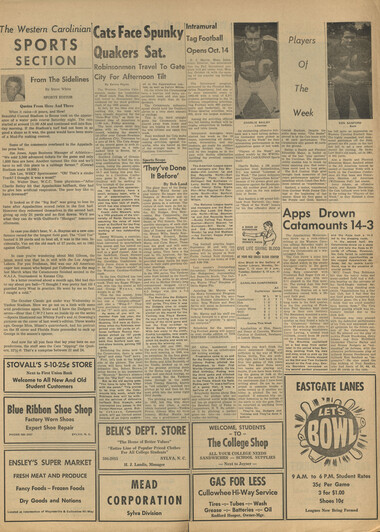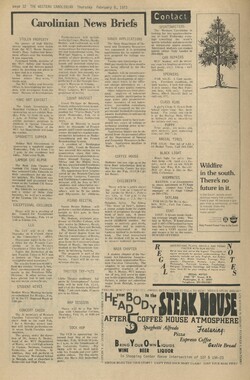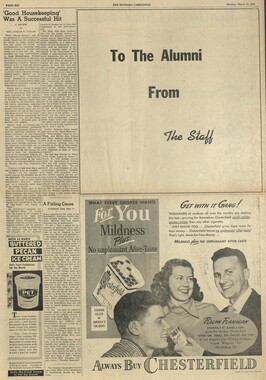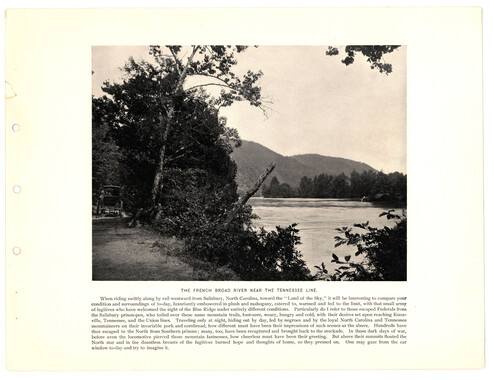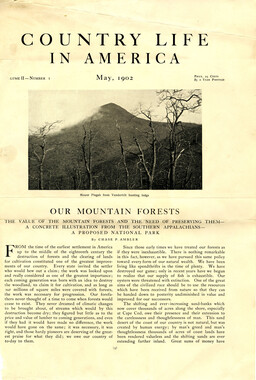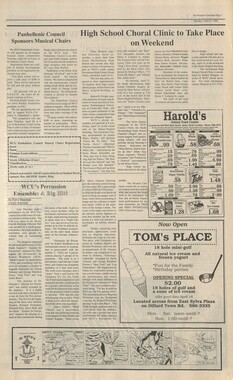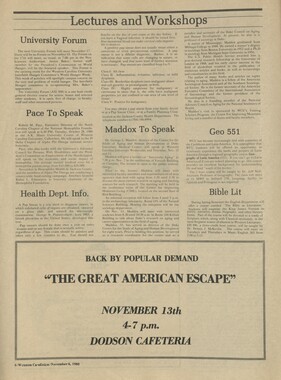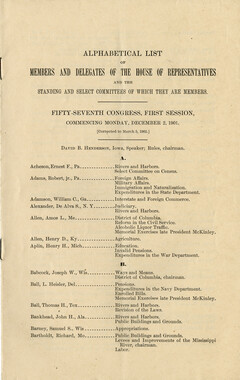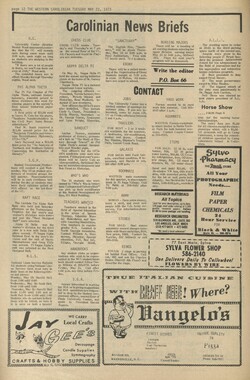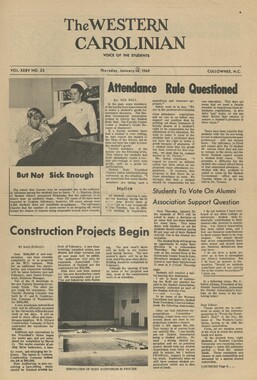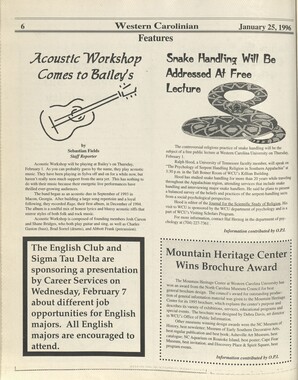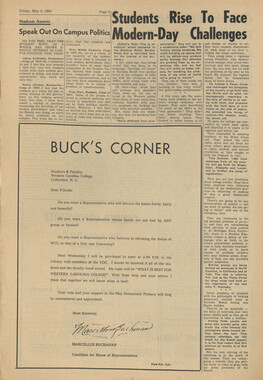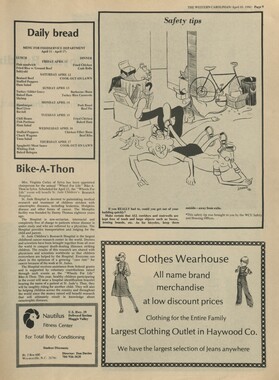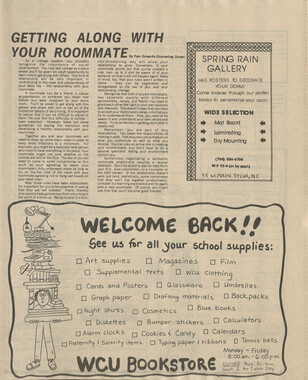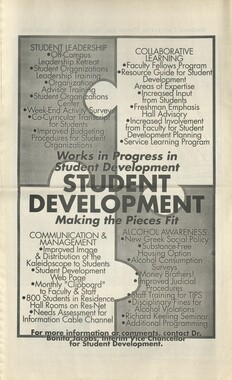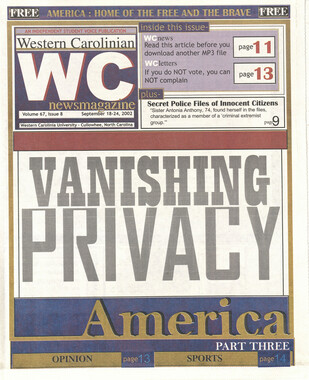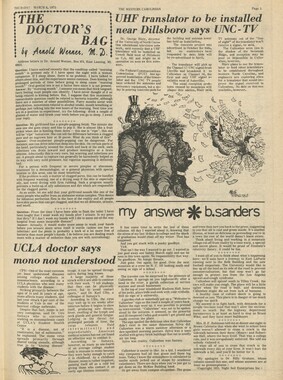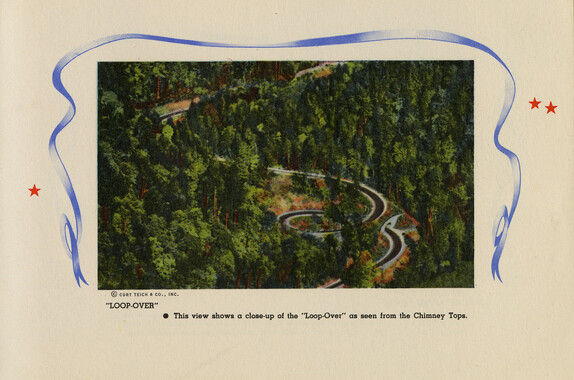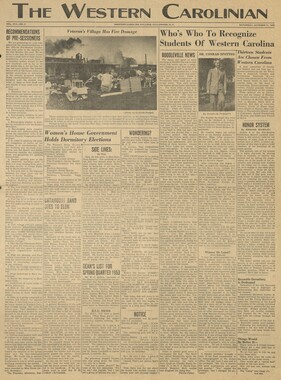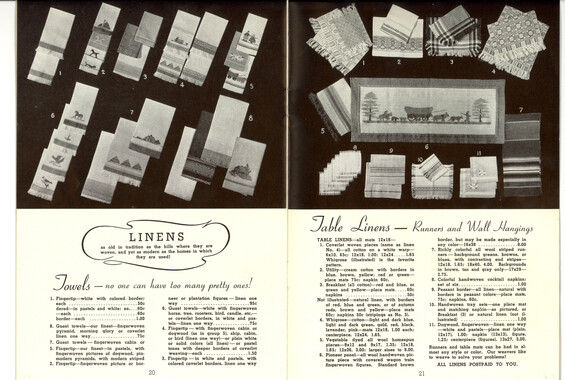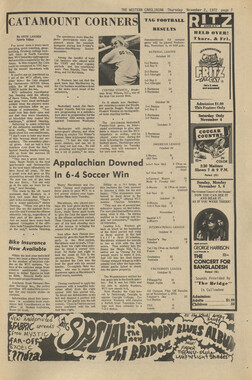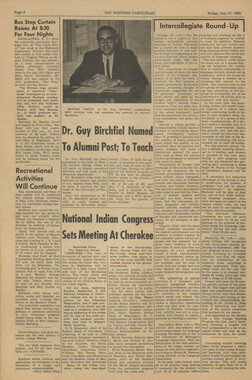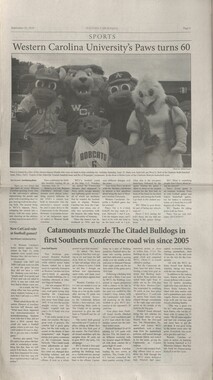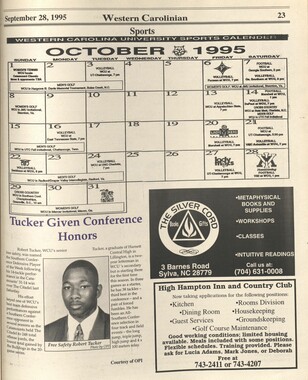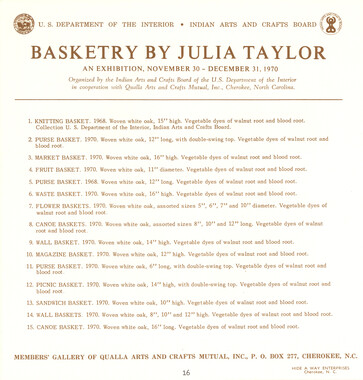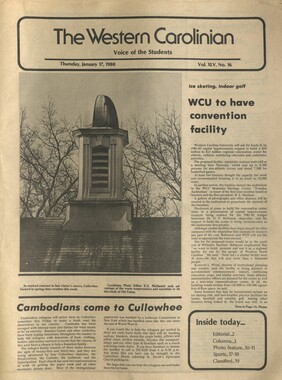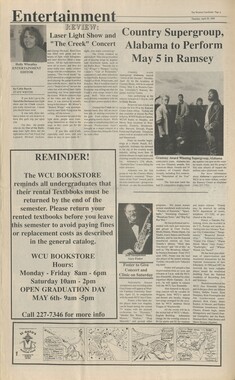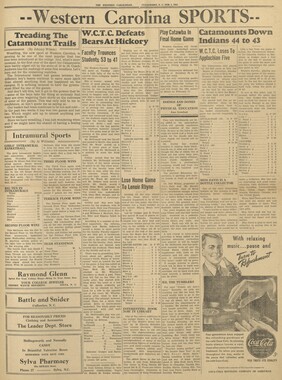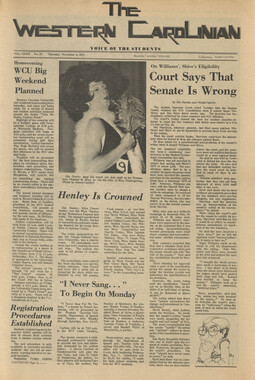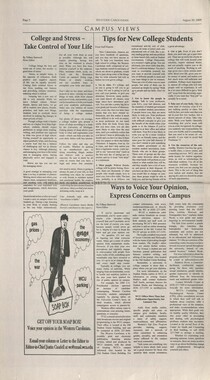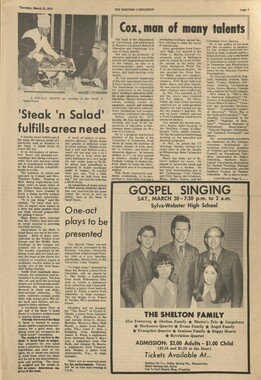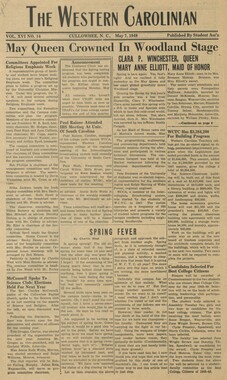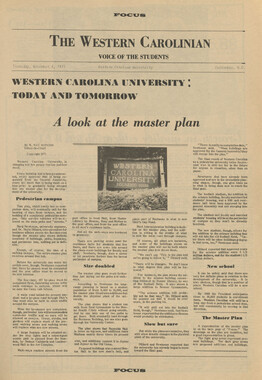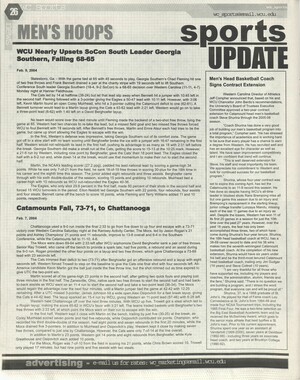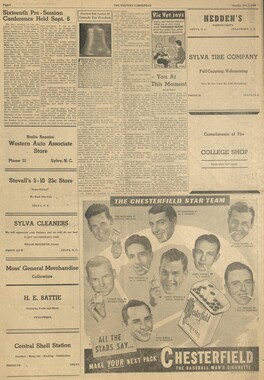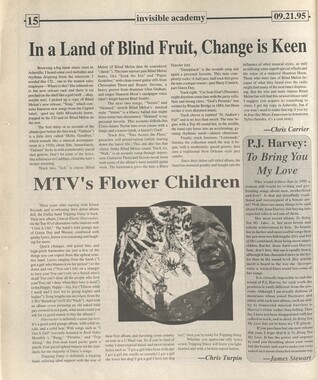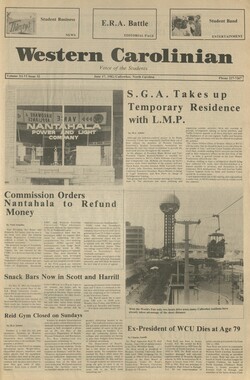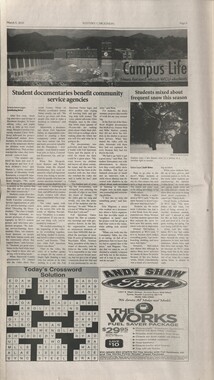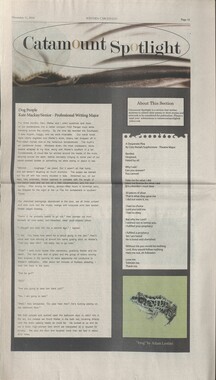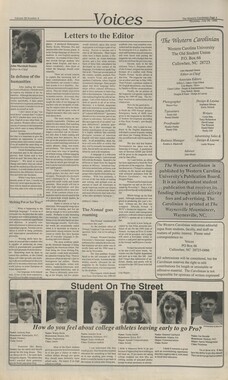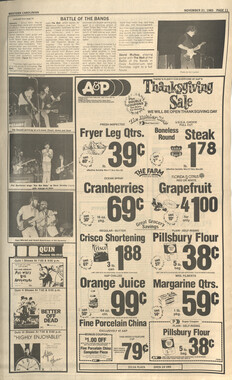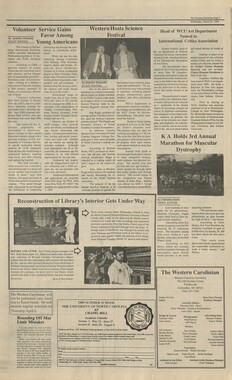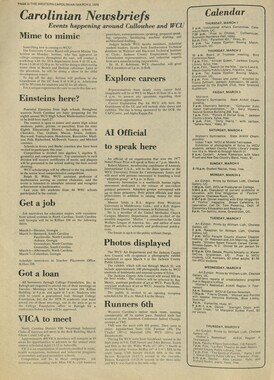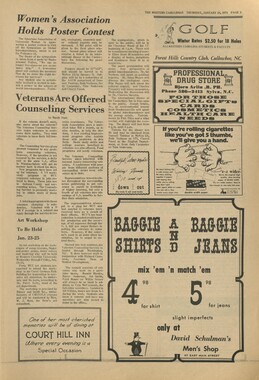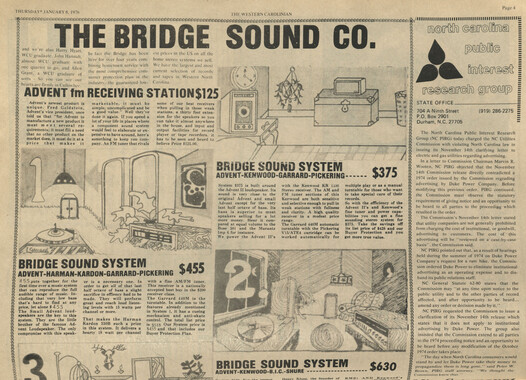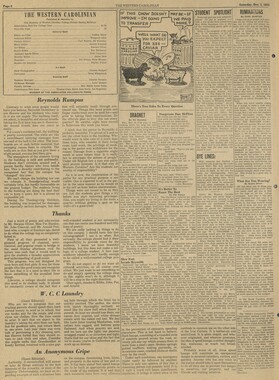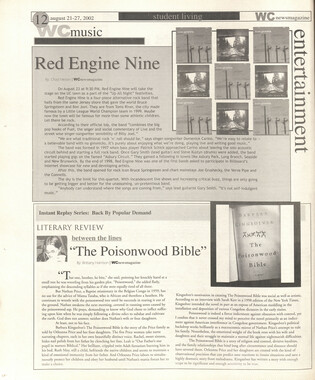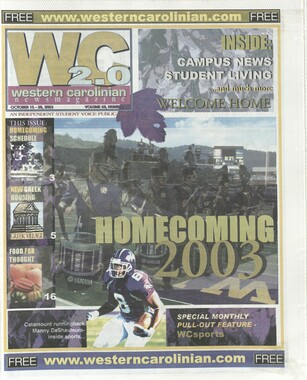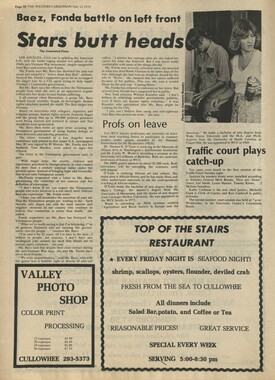Western Carolina University (20)
View all
- Canton Champion Fibre Company (2308)
- Cherokee Traditions (291)
- Civil War in Southern Appalachia (165)
- Craft Revival (1942)
- Great Smoky Mountains - A Park for America (2946)
- Highlights from Western Carolina University (430)
- Horace Kephart (941)
- Journeys Through Jackson (159)
- LGBTQIA+ Archive of Jackson County (85)
- Oral Histories of Western North Carolina (314)
- Picturing Appalachia (6798)
- Stories of Mountain Folk (413)
- Travel Western North Carolina (160)
- Western Carolina University Fine Art Museum Vitreograph Collection (129)
- Western Carolina University Herbarium (92)
- Western Carolina University: Making Memories (708)
- Western Carolina University Publications (2412)
- Western Carolina University Restricted Electronic Theses and Dissertations (146)
- Western North Carolina Regional Maps (71)
- World War II in Southern Appalachia (131)
University of North Carolina Asheville (6)
View all
- Allanstand Cottage Industries (62)
- Appalachian National Park Association (53)
- Bennett, Kelly, 1890-1974 (1388)
- Berry, Walter (76)
- Brasstown Carvers (40)
- Carver, George Washington, 1864?-1943 (26)
- Cathey, Joseph, 1803-1874 (1)
- Champion Fibre Company (233)
- Champion Paper and Fibre Company (297)
- Cherokee Indian Fair Association (16)
- Cherokee Language Program (22)
- Crowe, Amanda (40)
- Edmonston, Thomas Benton, 1842-1907 (7)
- Ensley, A. L. (Abraham Lincoln), 1865-1948 (275)
- Fromer, Irving Rhodes, 1913-1994 (70)
- George Butz (BFS 1907) (46)
- Goodrich, Frances Louisa (120)
- Grant, George Alexander, 1891-1964 (96)
- Heard, Marian Gladys (60)
- Kephart, Calvin, 1883-1969 (15)
- Kephart, Horace, 1862-1931 (313)
- Kephart, Laura, 1862-1954 (39)
- Laney, Gideon Thomas, 1889-1976 (439)
- Masa, George, 1881-1933 (61)
- McElhinney, William Julian, 1896-1953 (44)
- Niggli, Josephina, 1910-1983 (10)
- North Carolina Park Commission (105)
- Osborne, Kezia Stradley (9)
- Owens, Samuel Robert, 1918-1995 (11)
- Penland Weavers and Potters (36)
- Roberts, Vivienne (15)
- Roth, Albert, 1890-1974 (142)
- Schenck, Carl Alwin, 1868-1955 (1)
- Sherrill's Photography Studio (2565)
- Southern Highland Handicraft Guild (127)
- Southern Highlanders, Inc. (71)
- Stalcup, Jesse Bryson (46)
- Stearns, I. K. (213)
- Thompson, James Edward, 1880-1976 (226)
- United States. Indian Arts and Crafts Board (130)
- USFS (683)
- Vance, Zebulon Baird, 1830-1894 (1)
- Weaver, Zebulon, 1872-1948 (58)
- Western Carolina College (230)
- Western Carolina Teachers College (282)
- Western Carolina University (1899)
- Western Carolina University. Mountain Heritage Center (18)
- Whitman, Walt, 1819-1892 (10)
- Wilburn, Hiram Coleman, 1880-1967 (73)
- Williams, Isadora (3)
- Cain, Doreyl Ammons (0)
- Crittenden, Lorraine (0)
- Rhodes, Judy (0)
- Smith, Edward Clark (0)
- Appalachian Region, Southern (2569)
- Asheville (N.C.) (1923)
- Avery County (N.C.) (26)
- Blount County (Tenn.) (195)
- Buncombe County (N.C.) (1672)
- Cherokee County (N.C.) (283)
- Clay County (N.C.) (555)
- Graham County (N.C.) (233)
- Great Smoky Mountains National Park (N.C. and Tenn.) (519)
- Haywood County (N.C.) (3569)
- Henderson County (N.C.) (70)
- Jackson County (N.C.) (4804)
- Knox County (Tenn.) (35)
- Knoxville (Tenn.) (13)
- Lake Santeetlah (N.C.) (10)
- Macon County (N.C.) (420)
- Madison County (N.C.) (215)
- McDowell County (N.C.) (39)
- Mitchell County (N.C.) (132)
- Polk County (N.C.) (35)
- Qualla Boundary (981)
- Rutherford County (N.C.) (76)
- Swain County (N.C.) (2135)
- Transylvania County (N.C.) (270)
- Watauga County (N.C.) (12)
- Waynesville (N.C.) (86)
- Yancey County (N.C.) (72)
- Aerial Photographs (3)
- Aerial Views (60)
- Albums (books) (4)
- Articles (1)
- Artifacts (object Genre) (228)
- Bibliographies (1)
- Biography (general Genre) (2)
- Cards (information Artifacts) (38)
- Clippings (information Artifacts) (191)
- Copybooks (instructional Materials) (3)
- Crafts (art Genres) (622)
- Depictions (visual Works) (21)
- Design Drawings (1)
- Drawings (visual Works) (185)
- Envelopes (73)
- Exhibitions (events) (1)
- Facsimiles (reproductions) (1)
- Fiction (general Genre) (4)
- Financial Records (12)
- Fliers (printed Matter) (67)
- Glass Plate Negatives (381)
- Guidebooks (2)
- Internegatives (10)
- Interviews (815)
- Land Surveys (102)
- Letters (correspondence) (1013)
- Manuscripts (documents) (618)
- Maps (documents) (177)
- Memorandums (25)
- Minutes (administrative Records) (59)
- Negatives (photographs) (6015)
- Newsletters (1290)
- Newspapers (2)
- Notebooks (8)
- Occupation Currency (1)
- Paintings (visual Works) (1)
- Pen And Ink Drawings (1)
- Periodicals (193)
- Personal Narratives (10)
- Photographs (12976)
- Plans (maps) (1)
- Poetry (5)
- Portraits (4539)
- Postcards (329)
- Programs (documents) (151)
- Publications (documents) (2364)
- Questionnaires (65)
- Relief Prints (26)
- Sayings (literary Genre) (1)
- Scrapbooks (282)
- Sheet Music (2)
- Slides (photographs) (402)
- Songs (musical Compositions) (2)
- Sound Recordings (796)
- Specimens (92)
- Speeches (documents) (15)
- Tintypes (photographs) (8)
- Transcripts (322)
- Video Recordings (physical Artifacts) (23)
- Text Messages (0)
- A.L. Ensley Collection (275)
- Appalachian Industrial School Records (7)
- Appalachian National Park Association Records (336)
- Axley-Meroney Collection (2)
- Bayard Wootten Photograph Collection (20)
- Bethel Rural Community Organization Collection (7)
- Blumer Collection (5)
- C.W. Slagle Collection (20)
- Canton Area Historical Museum (2110)
- Carlos C. Campbell Collection (462)
- Cataloochee History Project (64)
- Cherokee Studies Collection (4)
- Daisy Dame Photograph Album (5)
- Daniel Boone VI Collection (1)
- Doris Ulmann Photograph Collection (112)
- Elizabeth H. Lasley Collection (1)
- Elizabeth Woolworth Szold Fleharty Collection (4)
- Frank Fry Collection (95)
- George Masa Collection (173)
- Gideon Laney Collection (452)
- Hazel Scarborough Collection (2)
- Hiram C. Wilburn Papers (28)
- Historic Photographs Collection (236)
- Horace Kephart Collection (861)
- Humbard Collection (33)
- Hunter and Weaver Families Collection (1)
- I. D. Blumenthal Collection (4)
- Isadora Williams Collection (4)
- Jesse Bryson Stalcup Collection (47)
- Jim Thompson Collection (224)
- John B. Battle Collection (7)
- John C. Campbell Folk School Records (80)
- John Parris Collection (6)
- Judaculla Rock project (2)
- Kelly Bennett Collection (1407)
- Love Family Papers (11)
- Major Wiley Parris Civil War Letters (3)
- Map Collection (12)
- McFee-Misemer Civil War Letters (34)
- Mountain Heritage Center Collection (4)
- Norburn - Robertson - Thomson Families Collection (44)
- Pauline Hood Collection (7)
- Pre-Guild Collection (2)
- Qualla Arts and Crafts Mutual Collection (12)
- R.A. Romanes Collection (681)
- Rosser H. Taylor Collection (1)
- Samuel Robert Owens Collection (94)
- Sara Madison Collection (144)
- Sherrill Studio Photo Collection (2558)
- Smoky Mountains Hiking Club Collection (616)
- Stories of Mountain Folk - Radio Programs (374)
- The Reporter, Western Carolina University (510)
- Venoy and Elizabeth Reed Collection (16)
- WCU Gender and Sexuality Oral History Project (32)
- WCU Mountain Heritage Center Oral Histories (25)
- WCU Oral History Collection - Mountain People, Mountain Lives (71)
- WCU Students Newspapers Collection (1843)
- Western North Carolina Tomorrow Black Oral History Project (69)
- William Williams Stringfield Collection (2)
- Zebulon Weaver Collection (109)
- African Americans (390)
- Appalachian Trail (35)
- Artisans (521)
- Cherokee art (84)
- Cherokee artists -- North Carolina (10)
- Cherokee language (21)
- Cherokee pottery (101)
- Cherokee women (208)
- Church buildings (172)
- Civilian Conservation Corps (U.S.) (111)
- College student newspapers and periodicals (1933)
- Dams (107)
- Dance (1023)
- Education (222)
- Floods (61)
- Folk music (1015)
- Forced removal, 1813-1903 (2)
- Forest conservation (220)
- Forests and forestry (1184)
- Gender nonconformity (4)
- Great Smoky Mountains National Park (N.C. and Tenn.) (181)
- Hunting (45)
- Landscape photography (25)
- Logging (119)
- Maps (83)
- Mines and mineral resources (8)
- North Carolina -- Maps (18)
- Paper industry (38)
- Postcards (255)
- Pottery (135)
- Railroad trains (72)
- Rural electrification -- North Carolina, Western (3)
- School integration -- Southern States (2)
- Segregation -- North Carolina, Western (5)
- Slavery (5)
- Sports (452)
- Storytelling (243)
- Waterfalls -- Great Smoky Mountains (N.C. and Tenn.) (66)
- Weaving -- Appalachian Region, Southern (280)
- Wood-carving -- Appalachian Region, Southern (328)
- World War, 1939-1945 (173)
Western Carolinian Volume 29 Number 04
Item
Item’s are ‘child’ level descriptions to ‘parent’ objects, (e.g. one page of a whole book).
-
-
Editorial Page Of The Western Carolinian 300 In '63 Blood is everybody's business. At least it should be. To the American Red Cross it is big business. Last year the Red Cross collected and distributed 2,638,200 pints of blood, setting a peacetime record. This year the Red Cross is out to break its own record as it enters its sixteenth year in the blood business; sixteen years of providing life-giving blood in the face of tragedy and disaster. The number of human lives saved because of the availability of needed blood for transfusions runs into the millions; lives saved because of the generosity of millions of citizens who sought to share their blood with those in need and because of the unceasing efforts of the Red Cross volunteers who collect, process and distribute blood when and where it is needed. Western Carolina College has never managed to keep pace, proportionally, on the giving end. Sometimes it has met its quota; sometimes not. Seldom has it topped it. This year the Red Cross hopes to secure three hundred WCC donors. The figure three hundred seems a trifle pessimistic but it is, we think, a pessimism not unwarranted in the light of past experience. And when you stop to think about it, it does seem strange that in a college community of some 2,500 students and faculty only three hundred can be persuaded of the concrete need for volunteers. We may not always agree with or even condone the actions or policies of the Red Cross but we cannot overlook the vital role its blood program plays in the preservation of human life. Thirty minutes in giving is short indeed when it means a lifetime to someone in need. Ask someone who knows and give that someone may live. 1963 Editor's Roundtable For twelve years the high-school journalists of Western North Carolina have participated in an Editor's Round- table sponsored by Western Carolina College and the Western North Carolina Press Association. This weekend they will hold their twelfth meeting. These young high-school newspaper and yearbook editors have one common interest, a desire to learn and share with others their knowledge of journalism. They bring with them problems and solutions to problems they have encountered. All of them share these experiences at the roundtable discussions. These meetings have produced notable effects and accomplishments in the past and we are confident that this year's gathering will make it's own mark. The Carolinian welcomes its fellow-journalists with the certain knowledge that it too will profit from their discussions. East Berlin: Capitol Of The GDR By Don R. Yarbrough It has been longer than two years now since one Peter Fechter attempted escape over the wall only a few hundred yards away from the checkpoint for foreigners in Friedrichstrasse. In last week's article we were about to enter East Berlin through "Checkpoint Charlie", and had walked up to this memorial to the dead Peter Fechter, a young East German lad who was shot by the Eastern police and lay dying for three hours. Tourists flocked by this commemorative cross on that Easter Sunday last April and made photos with no help from an East German guard. From a window on just the other side of the wall he used a mirror to reflect the sun's rays in everyone's camera. And written on the wall in white paint just behind Fech- ter's memorial are the words: "13,000 husbands are separated from their wives because of this wall; how long now" Located at the end of the American sector in Friedrich strasse are a series of barricades, several sections of the wall, and a house where one must get his money changed Into East German currency. You may take a camera Into the Eastern zone, but the serial number Is checked; you are not allowed to have any commercial goods on your person. The rate of exchange is one to one. One mark (worth approximately 25*) is the same worth on either side of the wall. A risky sport is to purchase East German marks at the rate of five to one in West Berlin or West German banks. However, this business is not a popular one since all tangible goods obtained in East Berlin must be declared on the way out accompanied by their sale's slips. And the total a- mount for these are checked against the amount of Eastern money you buy on the way in. To say one more thing as regards money differences— whereas Western coins are either coper or silver, all East German coins are aluminum. Once in Communist Berlin Student Government What You Can Do For Your Government... By Gerald Holder To paraphrase a line from President Kennedy's Inaugural Address this article will attempt to explain what you can do for your Student Government at Western Carolina College. To pose a few questions first, how many of you students are able to recognize your elected student representatives. Do you know who they are so that you could present your opinions and complaints to them? If not, learn who they are; this is your responsibility! The people on the Student Senate are elected to represent you, but on many occasions they can only present the opinions of eighteen people not the opinions of the students. In the past, on rare occasions, students have made personal appearances at Senate meetings to present ideas. This is good but of course this procedure could get out of hand. It is best to present your ideas and grievances to your student senator and then if you are not satisfied with the re sults, make a personal appeal to the Senate. This is both a priviledge and a duty of a college citizen. Criticism of the student government flows freely a-' mong students and there is justification for much of it. There is tendency for students to gripe but do nothing about their grievances. Subsequently, students lose interest in their student government and talk over their gripes at secluded midnight bull sessions in the dormitories. If you feel strongly about an issue then you should be able to compose your sentiments on paper and present them to a Senator for presentation in the Senate. Elected governments are supposed to be a reflection of the people who elect them. They usually reflect the "vigah" of the people they represent. When you judge your government do not forget to judge your own participation. What have you done for your Student Government? the contrast between the two city halves is striking. There are fewer people on the streets, fewer automobiles, and at night considerable fewer lights. The list is infinitely long—practically no advertizements (ninty - five percent of all enterprizes are controlled by the German Democratic Republic); prices are higher, (one lemon costs 500); there are no Western newspapers; cigaretts are East German, Russian, or Chinese; chocolates are expensive. Men and children immediately recognized me as a tourist and asked for cigaretts and chocolates. Billboards announcing coming e- vents such as theatre, cinema, and boxing, were generally three months out of date. Magazines insist that the new East Berlin is rapidly materializing, and that war damage is disappearing fast. More than half of the East Berlin that I saw is war ruin. The section of East Berlin that they want all tourists to visit (and where, unfortunately, most all tourists limit their stay) is the beautiful Karl Marx Allee, an avenue prognostic of tomorrow's East Berlin. Ultra-modern shops and apartments line this avenue. This three mile stretch has become the symbol of East Berlin's reconstruction in the first years after the war. But, comparatively, they have a long way to go. There are no parks resembling anything like those of West Berlin. Perhaps the most cherished one they do have is Treptow Park, a Russian Memorial Park erected to the soldiers of the Soviet army who fell during the fighting over Berlin. Everything is the "people's"—the people's press, the people's parks, the people's friendship league, etc. Published propaganda sings of the desire for peace and friendship among nations. The main excuse for the existence of the wall is that it is necessary to maintain the peace. West Berliners responded in either one of two ways when we tried to query them as to the reason for the wall. They would say nothing at all about politics, or they would render the identical argument in their own words about Walter Ulbricht's inevitable decisions and Willy Brandt's lies and provoca- JUST TRY IK) Look i DOFS*l'T DECJDF TO R)N K> D PRAY THArr HE International Scene The Great Presidents: Qualifications By Neal Evans Everybody seems to be getting into the picture. Numerous historians, all the Sunday supplements, and now President John F. Kennedy have come out with their lists of the outstanding presidents. This writer does not intend to present his favorites, but he will try to analyze the bases which are used in determining the various rankings. Most of the lists include the Presidents who happened to be on the scene when it was necessary for major actions. When asked why they thought West Germans could visit East Berlin while they were not allowed to leave the city, the talkative kind invariably answered that it was a law restricting them for their own protection. According to them, the ones who have escaped East Berlin are either insane or irrational fanatics. Their general answer to the question: "Why are there no West Berlin journals on the news stands?" was that the University library displayed every publication it could obtain from all over the world. According to a West German University student whom I met later on back in West Berlin, these newspapers are censored, revised or completely reprinted in East Berlin. "At any rate," he went on, "they are very selective with Western publications, and some are not to be found at all." Generally the people on the street exhibited a genuine warmth; few pedestrians were hostile with us. We met a group of Russian soldiers who laughingly insisted that we photograph them. They acted as any American G.I. doing to two year hitch in the army. To become a West German guard at the wall is a prized position to hold. A guard is carefully selected and receives years of training before he is qualified to become a guard. The Eastern military officials must be extremely cautious as to their selection for this post, because probably the supreme test of a guard's devotion to the GDR is shooting one of his own people who decided to make a break and escape into West Berlin. Leaving East Berlin required another two hours in order to get passport clearance, money re-exchanged, and the car searched. As I mentioned before, gate officials were impatient except a few who sarcastically urged us to "come again soon" to East Berlin. tion to be taken, such as found the country or free the slaves. They deserve it. George Washington did rise to the occasion when the country needed a father, and Abraham Lincoln, although he might be considered a victim of circumstances, did take the situation into hand and kept the country from splitting apart. The two intellectual greats certainly belong on the list. Thomas Jefferson initiated a large amount of early American political theory, and Woodrow Wilson, idealist though he was, more than a hundred years later was able to bring international respect to a country that had long been in self-imposed isolation. Many of the lists include Harry Truman, the stubborn haberdasher from Missouri, who came up through the ranks to the highest office in in the land. Here was a man who could make a decision and stick by it. Criticized and maligned, he weathered it out until people began to realize there was something to what he did. Hindsight they found is better than foresight. Another group is made up of the great reformers, those who through positive action changed the course of a nation. Andrew Jackson took the power from the hands of the aristocracy and gave it to the common man. He made room for "by the people" in Lincoln's famous quotation. Seventy-five years later, the United States got a reminder that the "common welfare" phrase of the Constitution was not just verbiage. Theodore Roosevelt laid the groundwork for the vast changes to come in this century. The third of this group was another Roosevelt, Franklin Delano, who instituted the most wide-spread social and economic reforms that this country had ever seen. He effected the changes that a rapidly growing nation needed to keep pace in a rapidly growing world. These eight men appear a- gain and again on the lists of the greatest; they are generally listed under their respective headings of the four classes. But who is to decide if these are sufficient criteria for the select group? Is it necessary that a President make important decisions, fill great needs, form major policies, or institute outstanding reforms? There seems to be a need for another classification. There exists a segment of public opinion that feels that a President who does nothing is a President who is best meeting the needs of the country. Maybe there is a point here. Milton tells us that "They also serve who only stand and wait." Do the laurels of greatness fall on the heads of some of the other Presidents? No, there is no need for further classifications. The historians and the other judges are on the right track. The United States stands as a mighty nation today because responsible men have accepted their obligations; because they have not avoided the difficult decisions; because they have not been afraid to step out in a forward direction. She is fortunate. By Bill Shawn Smith BOOK REVIEW: City of Night by John Rechy. Grove Press ($5.95). Here is a book written in the avant garde tradition probing the inner soul of a lonely man, a man deep in the twilight world of America's largest cities searching for that indefinable something that usually, and does, end up as that defineable nothing. The author has created a literary portrait of a nameless young man who leaves his home in El Paso, Texas, in search of "love." The man goes to New York where he feels he can assert his freedom and his restless drive to be independent. He meets a collection of strange characters who have a profound effect on his life and leave me, the reviewer, thankful that I'm safely tucked away at college. He meets Pete, the "young- man"—or male hustler—on Limelight the rough and ready corners of Times Square who teaches him the rules of the oldest profession. The narrator drifts in and out of the lives of these people, constantly being torn between social ridi- vule and emotional drive. When the young man tires of New York he travels to Market Street in Los Angeles. In Hollywood he makes contact with a new group of people with old group interests. There are the aging "boys" who carry around self - photographs of their youth. Everyone fights for youth as though it were a bath bubble. The narrator lives in a world where aristocracy is based entirely on age. The very young are kings (or queens) and the very old are the peasants who worship these kings. From Los Angeles he journ- ies to San Francisco and later to New Orleans, and each city conjures up its most unbalanced citizens to greet the traveler. But no one can reach the inner person of the narrator. He is always alone. Mr. Rechy writes, "I have merely breezed through other lives (like an emotionally un- involved tourist! something accuses me as I demember all those I have fled from — but I reject the accusation), avoiding myself behind a mask as real as those which, now, soon, outside, in the streets, I will face." Reacy's attempt to verbalize profound psychological depths sometimes misses the mark and becomes tedious and dull. Frankly, most of the time I could not care less about the people he meets. He seems to lose contact with the real world. He makes the small minority of his characters appear to be controlling the world; often during the reading I had to run to to window to make certain that there were still humans on the outside, or inside. It is interesting to view the "lost" generation through extreme eyes. It makes one feel —Continued to page 3 gort Hello, Lucifer. Hi,Gort? May I count on your presence at my revel this evening? "rf§> Splendid? As aiways, booze and wenches will be in abundance...but wait'll you hear the musician I've hired V. Gort, this boy car\ blow a horn like...well...he's Simply hypnotic1.'1. 0^} ...tjou need Hypnotic,eh?T anticipate Well,! no longer?., certainly Mere comes anticipate... that cod horn nowT.r Feedback Dear Editor: Papers, Papers, Everywhere! Don't you think that this college campus would be more beautiful with the coming of fall, if there were fewer paper cups and other trash on the grounds? As many trash cans as we can see a- round the campus then see all of the paper out of them is a disgrace. Yes, we have a maintenance department, but they have more important things to do, other than picking up papers. Help them by putting papers in the cans. It will help beautify our campus and make us all feel proud of Western Carolnia. Bert King THE WESTERN CAROLINIAN is published every week during the academic year with the exception of mid-term and final exam weeks by the students of Western Carolina College. Represented for National Advertising by National Advertising Service, Inc., 18 East 50th Street, New York 22, New York. Offices are located on the second floor of Joyner Building. A member of the Intercollegiate Press Association and the Carolina Press Association. SUBSCRIPTION RATE — $2.00 PER SCHOOL YEAR James D. Callahan Editor John B. Thomas Business Manager Pat Maddox News Editor Bill Shawn Smith Feature Editor Steve White Sports Editor Robbyn Morrow Layout Editor Jerry Chambers Copy Editor Gerald Holder, Bill Shawn Smith, Neal Evans, John Thomas, Robbyn Morrow Columnists Jean Harlow, Randall Peters, Brenda Taylor Reporters Howard Perkins Cartoonist Daphne Hoffman Typist Henry G. Morgan Sponsor On Campus By Robbyn Morrow "Has the bell rung?" Th correct answer is "Wv,6 Knows??" The only one Z can be sure of is the Victory Bell—and it definitely isnu ringing. During the regular class day maybe you hear a bell, maybe not—or then a gain, maybe you heard five bells and you hesitated to play favorites among them so you just cut class and went to the Town House. We probably never realized what well-disciplined creatures of habit we are until the bells get taken away from us. Our lives center around them. They put us in class let us out again, they tell us when it's mealtime, and they wake us up on Sunday morning. (That last is church bells of course.) We get accustomed to them, we adjust our to them, we grow to love them, then all of a sudden the electricity gees off and we are rendered bell- am! nobody knows exactly what to do. There are other ways, of course, to tell when it is mealtime, but how is one to convey to the pro- that he has talked 15 minutes overtime—while you sit there, knowing all the while that your next class has started, and that you probably won't have time to stop and rest between classes. Since the main problem centers around getting out of class on time, we the students must devise ways cf tactfully making the professor understand that he isn't really getting time-and-a-half for everything over 50 minutes. There are always the time- honored ways of shaking your watch unbelievingly (which is especially effective if you sit on the front row), popping your books shut and looking nervously at the door, and making half-disguised attempts at leaving—. but these methods lack that essential element of tact, and might serve to antagonize even the most lenient professor. Other more imaginative methods must be created, which will be equally as successful as the ones mentioned above. First of all, we must remember that we are adults appealing to a fellow adult who, at the moment, holds us with a power which binds us in a very un-adult manner. Thinking first of him, we realize that he has been talking for 50 minutes, and that undoubtedly his voice is tired. Of course, he obviously doesn't know that his voice is tired because there he stands, showing absolutely no sign of fatigue. So, we must show him the way, and the power of suggestion is sure to win. All watches should have been synchronized at the beginning of the hour, and at exactly 10 minutes before the next hour, each person in the class should simply look as exhausted as he can possibly look. This is to be accomplished by letting pencil drop from numb fingers, by exposing tongue and tonsils in deeply sincere yawns, and by lifting weary eyelids in such a way as to point up any convenient accessories such as bloodshot eyes and dark circles under them. If everybody in the class cooperates, the professor who possesses any humanitarian instinct will offer to use his car to take them all to the Infirmary, and thus class will be dismissed. A second possible strategy: All during the period everybody takes notes as usual, demonstrating that they are striving to maintain good pupil-teacher relationships. All of this stops, however, when bell-time arrives. Because when that time comes the pupil-teacher business ceases; you become, once a- gain, fellow-adults. To convey this to the still-lecturing fellow-adult professor, one leans back in his seat, stops taking notes, and gives the professor the type of fixed stare which says: "I know that now I'm no longer your pupil, but rather I am your equal, and now I shall listen to you with the polite interest which one adult accords to his fellow." That's a pretty long sentence to cram into one stare, but if one doesn't blink, it could be done. In the ifnal analysis, perhaps flash-cards would be best, if they display artistic taste, using pleasing colors and old English lettering. ..When each member of the class held up, at exactly 1° minutes before the hour, an artistic flash card which read, "Ting-a-ling-a-llng," the ensuing panic might destroy the last of his sanity- And with a prospect of that magnitude in mind . . . Who needs bells? ?
Object
Object’s are ‘parent’ level descriptions to ‘children’ items, (e.g. a book with pages).
-
The Western Carolinian is Western Carolina University’s student-run newspaper. The paper was published as the Cullowhee Yodel from 1924 to 1931 before changing its name to The Western Carolinian in 1933.
-

